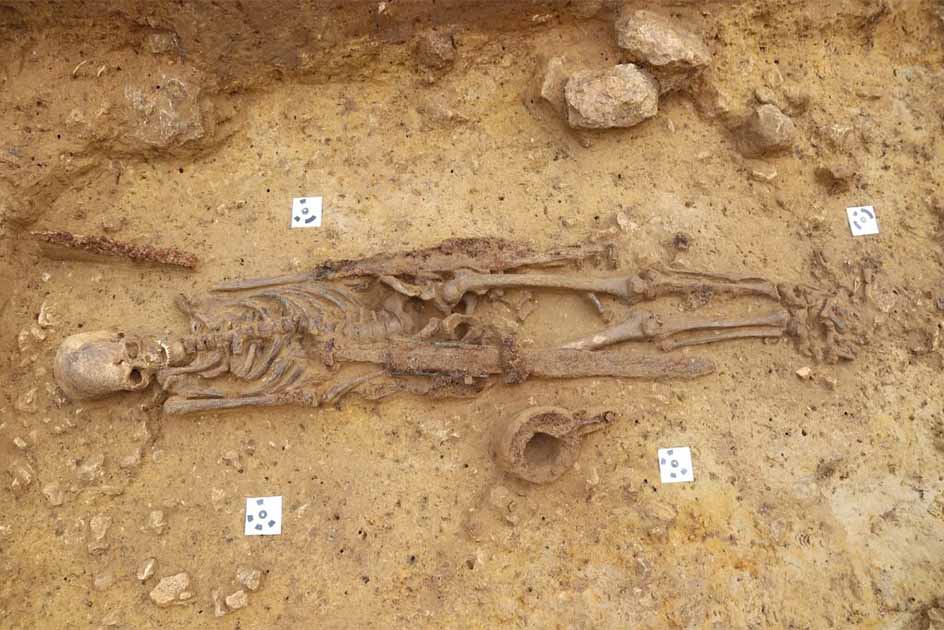‘Armed to the Teeth’ Frankish Warrior’s Untouched Grave Found
In a discovery that has left historians and archaeologists astonished, a completely untouched grave from the Merovingian period was uncovered in Germany. Hidden among other graves that were plundered over a millennium ago, this singular grave had rested undisturbed for over 1,300 years.

The discovery was made by the archaeologists from the Kaiserpfalz Research Center , who have been digging at this early medieval burial ground since 2015. Christoph Bassler, excavation manager described the discovery:
“We first spotted the edge of a shield boss…It wasn’t immediately clear which grave it belonged to. But, as we dug further, the realization dawned that we had stumbled upon a grave that, for some reason, had been overlooked by ancient grave robbers.”
A 7th Century Frankish Warrior, ‘Armed to the Teeth’
The grave’s occupant, known as the “warrior from grave 447,” was evidently someone of importance in his time. A splendid double-edged sword, or ‘spathe’, lay next to him, measuring nearly 93 cm (3 foot) in its entirety. Its blade, even after so many centuries, remains slightly flexible , pointing to an impeccable state of preservation, noted Bassler.
The sword wasn’t the Frankish warrior’s only companion in the afterlife. A massive broadaxe, another heavy knife, a lance tip, and a shield were found, showcasing an array of almost every weapon from that era—except for a bow.
Interestingly, while adorned with an impressive weaponry collection, this man was not a full-time soldier. In the early Middle Ages , there were no standing armies as we know them today. Free men were expected to gear up and respond to their leader’s call to arms when required.
The Franks in Europe
The Franks, one of the prominent Germanic tribes, played a central role in the reshaping of European geography and politics after the fall of the Roman Empire . Their history in the region was rich and transformative.
Between the 5th and the 8th centuries, with the decline of Roman power, the Franks under King Clovis I unified various Frankish tribes and expanded their territories. In 486 AD, Clovis defeated the last Roman governor in Gaul, marking the end of Roman rule in that region. Clovis and his successors, known as the Merovingians, expanded the Frankish kingdom into what is now Germany, establishing a significant portion of the region as “Austrasia.” Under the Merovingians, the Franks converted to Christianity, and the fusion of Germanic and Roman traditions began.
Related Post
The entire tomb is filled with signs and symbols that mention Queen Nefertiti and after some time passed and linguistic experts managed to decipher the stories told here, the team was baffled.
The mystery of the Solar Temple of Abu Gurab and its “Star Gate” comes to light
Thuya, the mother of Queen Tiye, left a monumental legacy by becoming the grandmother of Akhenaten and Tutankhamun.
The oldest traditions lead us to believe that blacks were the first inhabitants of Mexico.
The REAL face of King Tut: The pharaoh had feminine hips, clubfoot, and protruding teeth according to the ‘virtual autopsy,’ which also revealed that his parents were brother and sister.
The “oldest gold of humanity” was found in the Varna necropolis, on the Bulgarian Black Sea coast

